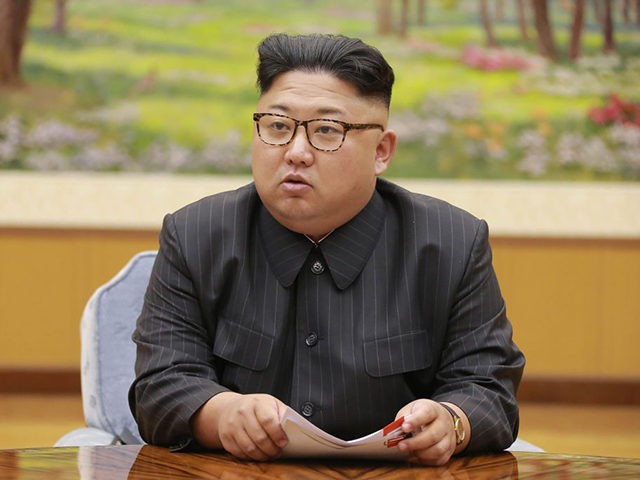North Korean communist dictator Kim Jong-un berated his senior Workers’ Party of Korea (WPK) officials this week, regime-controlled media reported Wednesday, for “creating a great crisis” and obstructing the “state emergency epidemic prevention system,” hinting at a purge of “irresponsibility and incompetence.”
North Korea’s state media apparatus typically refers to Pyongyang’s response to the Chinese coronavirus crisis as “epidemic prevention,” indicating that Kim is dissatisfied with the work his regime is doing to prevent the spread of the disease. The state-run Korean Central News Agency (KCNA) did not elaborate on what Kim was referring to when accusing his cadres of “creating a great crisis,” though Kim has hinted in recent memory of conditions brewing for a nationwide famine and an increasingly severe coronavirus outbreak in the country. Officially, North Korea claims it has documented zero coronavirus cases within its borders, a statement many in the global public health community have questioned.
Kim made his remarks to the WPK Politburo on Tuesday, according to KCNA.
Senior officials “in charge of important state affairs neglected the implementation of the important decisions of the Party,” Kim reportedly asserted, particularly on policies tied to “the prolonged state emergency epidemic prevention campaign associated with the worldwide health crisis.” Their disregard for public health, Kim allegedly claimed, “caused a crucial case of creating a great crisis in ensuring the security of the state and safety of the people and entailed grave consequences.”
Among the insults Kim hurled at his own party were allegations of “ignorance, disability and irresponsibility;” “self-protectionism, passiveness, subjectivity and arbitrariness;” possessing an “incapable and irresponsible work attitude,” and being “obsessed with defeatism.”
“The senior cadres holding major posts of the Party … caused grave obstructions to the sustained consolidation of the state emergency epidemic prevention system,” according to the dictator.
“He severely criticized the attitude of working like a flash in the pan, empiricism and old way of thinking generally revealed among cadres,” KCNA said of Kim.
Kim reportedly concluded that the dictator declared, “now is the time to bring about a revolution in personnel administration,” an apparent euphemism for a Party purge.
The tense and punitive Politburo meeting followed an assembly in mid-June bringing together a larger percentage of WPK leaders in Pyongyang in which Kim focused not on the coronavirus pandemic, but on the nation’s increasingly dire food shortages.
“Saying that in particular, the people’s food situation is now getting tense as the agricultural sector failed to fulfill its grain production plan due to the damage by [the] typhoon last year, [Kim] stressed that the plenary meeting should take a positive measure for settling the problem,” KCNA reportedly Kim as stating. Kim’s senior cadres spent much of that plenary Party meeting discussing how to ensure a “good crop” next fall to feed the populace, according to state media.
North Korea, much like neighboring China, endured severe floods last summer that destroyed a significant percentage of the country’s farmland. Kim Jong-un appeared to belie the gravity of the situation in a speech in October. Kim sobbed on national television, apologizing for his failures personally.
“Our people have placed trust, as high as sky and as deep as sea, on me, but I have failed to always live up to it satisfactorily. I am really sorry for that,” Kim said. “Although I am entrusted with the important responsibility to lead this country … my efforts and sincerity have not been sufficient enough to rid our people of the difficulties in their life.”
Kim reiterated in April that North Korea was in what he described as its “worst-ever situation.” Covert reports out of the country a month later revealed that the struggle for food has resulted in some North Koreans killing to steal others’ food and little response from the government to prevent starvation.
Radio Free Asia (RFA) reported last week, citing sources in South Korean media, that the desperation to ensure that this year’s crop yield surpasses 2020’s has led local communist officials to force nearly 14,000 housewives to move into the fields and work on planting crops.
Adding to the intrigue surrounding the true extent of North Korea’s food crisis are recent photos of Kim, believed to be obese for the entirety of his public life, appearing to have lost a dramatic amount of weight. KCTV, the broadcast analog of KCNA, aired an interview with a man identified as an average North Korean lamenting Kim’s new figure and claiming that the entire country was “most heartbroken to see respected General Secretary looking thinner.”
The South Korean newspaper Chosun Ilbo claimed Tuesday, citing anonymous sources, that Kim “went on a diet retreat” at the behest of his closest confidants, making his weight loss intentional rather than the inadvertent product of a food crisis.

COMMENTS
Please let us know if you're having issues with commenting.